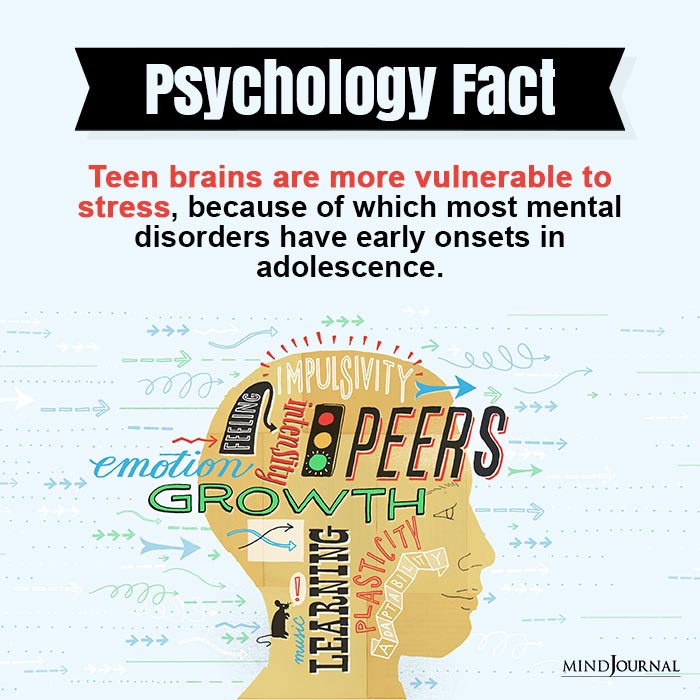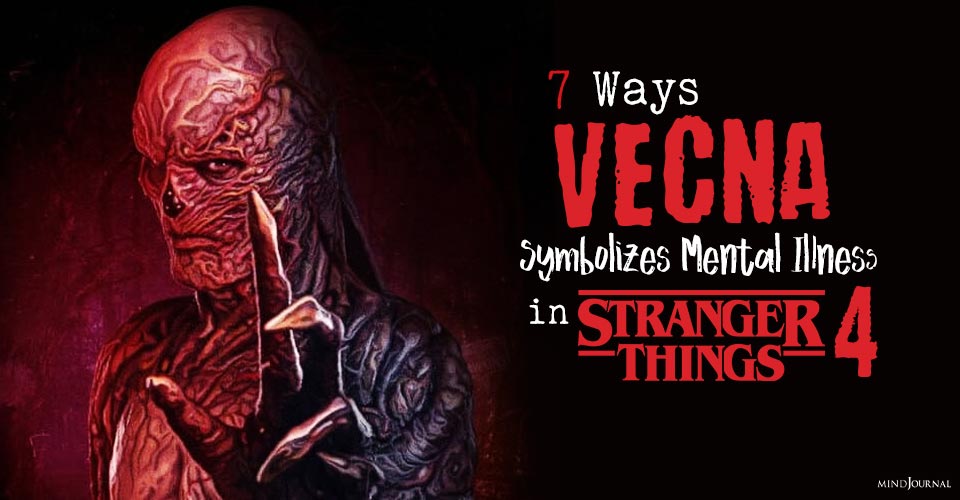Stranger Things isn’t just a horror television show but it implicitly tells us the importance of mental health and having friends or family beside us in the most daunting times of our lives.
Because there is an upside down in our inner world. The one that’s dark and hidden from everyone else.
The main antagonist Vecna or ‘01’ in Stranger Things Season 4 is named after a classic D&D god, but it stands as a metaphor for something deeper. Let’s find out about externalizing trauma and depression in Stranger things season 4.
Warning: SPOILERS ahead.
How Does Vecna In Stranger Things Symbolize Mental Illness?
Stranger Things on Netflix introduced us to frightful creatures like the Demogorgon and the Mind Flayer in its first three seasons. But in the fourth season, the show unveiled the scariest monster yet: Vecna (Jamie Campbell Bower).
Vecna, a humanoid, demonic entity, targets his prey with careful thought and precision, unlike the Demogorgons who kill anyone that gets in their way.
Vecna picks out psychologically damaged teenagers in the fictional town of Hawkins, Indiana, torturing and killing those who are most vulnerable or isolated. He feeds on their past traumas and insecurities and he is the downright personification of anxiety, depression, and PTSD, combined together.
Related: 5 Crucial Life Skills That Complex PTSD Can Teach You
Trauma and Depression in Adolescents
Any incident in life that threatens our safety and may endanger our own life or the lives of others is considered traumatic.

A person thereafter goes through intense emotional, psychological, and physical pain and grief, which temporarily impairs their capacity to do daily activities regularly. After a traumatic occurrence, teenagers frequently oscillate between independence and insecurity.
They could be really distressed by particular incidents, yet they might not express their emotions to their parents, friends, or close ones.
Vecna is like trauma and depression in teenagers who creeps into thoughts and slowly begins to poison them. He takes control of the minds of teenagers before he can destroy them completely — this is a potent representation of mental illness and teenagers like Fred who deals with trauma and guilt because of an accident dealing with his friend, Max who deals with the grief and trauma of her half brother Billy’s death and others get stuck in the mire of guilt, shame, or trauma and find themselves unable to escape.
Related: Is Marvel’s Moon Knight A Superhero With Mental Illness?
Common Signs Of Trauma And Depression Among Teenagers
- Disturbing emotions such as anger, anxiety, sadness, or guilt
- Overreacting to trivial matters
- Repetitively thinking about the traumatic event
- Withdrawing from family and friends
- Wanting to spend time in isolation
- Disturbed sleeping patterns
- Need for independence or rebellious behavior
- Loss of interest in school, hobbies, or life
- Having a pessimistic outlook on life
- Being distrusting of others
- Depression and feelings of hopelessness
Similarly in Stranger Things 4 Vecna curse, the victim begins to have severe headaches, nosebleeds, and nightmares regarding any traumatic event in their past.
The ones cursed have waking hallucinations and often see people or terrifying things that taunt them about their secrets and past traumas.
7 Ways Vecna Is An Allegory For Mental Illness: Depression and Trauma
Vecna may be a source of horror and terror in Stranger Things, but this monster is similar to the real-life monster called Mental Illness. It can also serve as an important vessel pertaining to trauma and depression.
1. Drains Hope From Its Victims
People who are depressed frequently feel like there is no hope left for their future. This feeling of hopelessness and helplessness might make it seem as though the agony will never be over.
Similarly, Vecna drains all hope of survival and happiness from his victims by invoking darkness. Vecna reminds each of his victims that there is no escape from his mental, emotional and physical torment, signifying how mental illness affects our psychological, emotional, and physical health.
The victims feel that there is no escape from their impending death at the hands of this evil monster from the upside down.
Related: Do You Have Crippling Depression? Here Are The Signs You Should Know About
2. Disturbing Flashbacks Or Memories Similar To PTSD
All of Vecna’s victims have unsettling and agonizing memories connected to their history which is similar to post-traumatic stress disorder, in which many of these recollections begin quickly and startle the person.
Chrissy (Grace Van Dien) battled an eating disorder before she was killed by Vecna. Her psychological trauma was a result of growing up with a violent mother. Fred (Logan Riley Bruner) frequently has images of the car accident he started that claimed the life of another student.
As a result of Max’s (Sadie Sink) frightening visions of Billy (Dacre Montgomery) and her mother, her guilt and self-blame are reinforced. These visions are all representations of the prior untreated trauma the characters have experienced.
3. The Nightmares of Vecna’s Victims
Intense nightmares and night terrors, which prevent them from falling asleep, are common in both depressive patients and those who are cursed by Vecna in this show. Max explains to her friends that the guidance counselor at the school notes the symptoms experienced by the teenagers in school are the same as hers. She believes that Vecna’s curse is the cause of her headaches.
As Vecna tortures his victims while, it is revealed later in the season that all of his victims share this common trait. People frequently have problems falling or staying asleep while depressed. This might manifest as nightmares, sleeplessness, or even night terrors.
4. Vecna Affects Your Body
Vecna’s power has both physical and mental side effects. The patients exhibit physical symptoms such as weariness, lack of sleep, headaches, and nosebleeds, which are similar to those of depression.

Similar to how a person’s physical health deteriorates when dealing with trauma and sadness. A wide range of physical ailments is more common in people who have mental illnesses.
5. You Can Fight The Curse With Music
The Stranger Things characters haven’t really discovered much that can help them fight Vecna and his curse. However, Robin (Maya Hawke) and Nancy (Natalia Dyer) discover that Victor Creel (Robert Englund) escaped due to music playing in the background after interacting with him at Pennhurst Mental Hospital.
Similarly, music is well known to have many positive effects when it comes to battling depression. Even studies suggest that music therapy can improve symptoms of depression, reduce anxiety, and help with sleep.
6. Vecna Isolates Victims From Loved Ones
It’s common for people who are depressed to withdraw and shut down. Additionally, a lot of people avoid talking to loved ones about their thoughts because they are ashamed of their depressed state.
In season four of Stranger Things, Max deals with the grief of Billy’s death, withdraws from her friends, and ends her relationship with Lucas. He tries to talk to her, but she refuses to open up, making her loneliness grow more and more intense.
Related: How Telling A Story Can Help Someone Contemplating Suicide
7. Escaping Vecna’s Curse Is A Difficult Battle
Fighting depression is a never-ending and challenging battle. Just trying to move on might be exhausting for many people. Even simple tasks like getting out of bed, taking a shower, and having a meal might seem like an enormous challenge.
This is why the battle with Vecna is an allegory of mental illness because breaking the curse of Vecna’s world and depression is equally challenging. Max is inspired by the good that is still present in her life and is able to sprint to the light because of her friends and the support received from them.
Piggyback From The Upside Down
Stranger Things Vecna may be a supernatural entity, but that doesn’t mean it’s meaningless. The first half of Season 4 demonstrates the importance of mental health treatments for trauma, PTSD, and suicidal tendencies. And that you don’t have to face your demons alone when you have supportive friends and loved ones on your side.











Leave a Reply